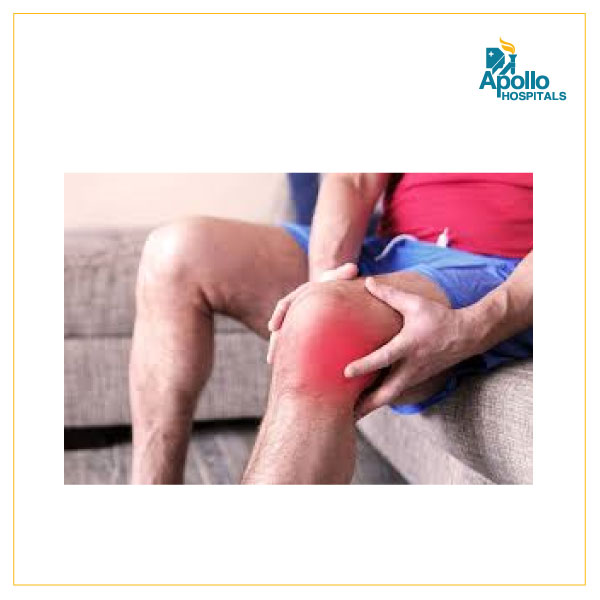Could not find what you are looking for?
- Health Library
- Joint Pain: Types, Causes & Treatment
Joint Pain: Types, Causes & Treatment


Verified by: Dr. Siddhart Yadav, Consultant, Orthopedics & Joint Replacement Surgery, Apollo Hospitals Navi Mumbai
Joints are where our bones meet in the body. They connect bones and allow the different parts of the body to move. Most joints in your body are mobile.
What is joint pain?
Any discomfort, soreness, inflammation, or aches in joints are considered joint pain. It may lie within your cartilage, ligaments, tendons, bone, or muscles. In most cases, joint pain is due to arthritis, an inflammation of the joints that causes swelling. However, many other factors can lead to joint pain. You may also have mild joint pain after specific activities. Severe joint pain can even limit your movements and is generally prominently painful while bearing weight.
Joint pain causes
Arthritis is the most common reason for joint pain. However, joint pain also occurs due to various factors, such as infections, injury, and inflammation. If you experience pain in multiple joints, you likely have polyarthralgia.
The potential causes for joint pain can be either arthritis-related or not related to arthritis.
Arthritis-related causes
Your joint pain may be a result of arthritis-related causes if you have inflammation or damage within the joint.
Mainly four types of arthritis are associated with joint pain.
- Osteoarthritis: Osteoarthritis happens when the cartilage which cushions the ends of bones in the joints deteriorates gradually. Finally, if the cartilage wears off completely, bone will rub on the bone.
- Rheumatoid Arthritis (RA): rheumatoid arthritis is an autoimmune disorder. It occurs when the immune system attacks your own body’s tissues by mistake. Unlike the wear-and-tear damage that happens in osteoarthritis, rheumatoid arthritis affects the lining of the joints.
- Gout: Gout is the crystallization of uric acid in the human body. The uric acid moves to spaces within joints and leads to inflammation.
- Septic Arthritis: Septic arthritis mainly develops due to bacterial infections. Your joints have synovial fluid within them. When bacteria get into this fluid, they damage the cartilage and eventually result in joint pain.
Causes unrelated to arthritis
Many factors unrelated to arthritis can also cause joint pain. Some of the major causes include:
- Injury: An injury in your joints due to excessive exercise or activity can lead to joint pain. It may also be the result of fracture, strain, or sprain. For instance, a knee injury can damage the ACL (anterior cruciate ligament) and cause knee pain. People involved in sports like basketball, soccer, and football are more prone to ACL.
- Viral Infections: Often, the joint symptoms are preceded by or coincide with the symptoms of a viral infection like fever, fatigue and muscle ache. In certain cases, there may be a rash similar to that seen in rheumatic diseases. Viral arthritis also tends to manifest with polyarthritis (arthritis in more than five joints).
- Fibromyalgia: Chronic pain is a predominant symptom of fibromyalgia. Some people with this disease have minor joint swelling while others have aches.
- Depression: It might be surprising, but when pain and aches occur due to unexplained causes, depression can also be a factor. Pain is the primary physical manifestation.
What are the treatment options for joint pain?
Joint pain treatment options depend on the underlying cause. They may include home treatment, medications, physical therapy, and surgery, which is usually the last option.
Your doctor may draw out the accumulated fluid to test for gout, infections, or other causes. In case of a serious condition, the doctor may also recommend joint replacement.
- Medication: Joint pain is curable with medications. If your pain is in the initial stage and you do not have any major underlying issue, doctors may prescribe medications depending on the cause of the pain in the case of an autoimmune issue, doctors recommend medication to alter the way your immune system works.
- Physical therapy: Physical therapy is about managing joint movements. It minimizes the pain and stiffness in joints. Physical therapy strengthens the muscles around the joints. Doctors may suggest a brace, walking aid, or splint.
- Surgery: Surgery is the last option of treatment for joint pain. When a person has pain in the knees or hip osteoarthritis, doctors recommend surgery. In a severe condition, joint replacement can be considered.
Conclusion
Joint pain is often a result of an unhealthy lifestyle. Frequent joint pain is hard to miss and a reminder to visit a doctor. Joint pain is easier to treat when the cause is determined.
Book an appointment to consult the best orthopedic doctor. Call 022 6280 6280 or visit Apollo Hospitals Navi Mumbai.










